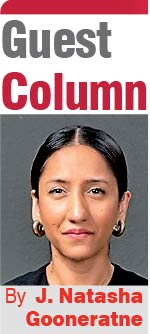Tuesday Feb 17, 2026
Tuesday Feb 17, 2026
Thursday, 27 November 2025 00:18 - - {{hitsCtrl.values.hits}}
 Throughout a political career that has spanned decades, Michael Morris, Baron Naseby or Lord Naseby as he›s better known, has emerged as perhaps Sri Lanka’s most steadfast and longstanding advocate in the Global North. His intellectual rigor, normative commitments, and personal affection for the island position him uniquely in the arena of post-conflict discourse, international law, and diplomatic contestation.
Throughout a political career that has spanned decades, Michael Morris, Baron Naseby or Lord Naseby as he›s better known, has emerged as perhaps Sri Lanka’s most steadfast and longstanding advocate in the Global North. His intellectual rigor, normative commitments, and personal affection for the island position him uniquely in the arena of post-conflict discourse, international law, and diplomatic contestation.
I was fortunate enough to meet with him last year at the House of Commons and the thing that struck me most, was his representation of his connection to my island home; deeply personal, rooted in his early sojourn on the island as a young marketing executive for Reckitt and Colman in the early 1960s, and free of any form of complexity-stripped comparison of a Sri Lanka-then and a Sri Lanka-now, which I myself have been guilty of. He is often quoted as describing Sri Lanka as his “beloved country,” and while we spoke I realised that this was not a sentiment likely born of abstract solidarity but forged amid authentic relationships with Sri Lankan friends, family, and political leaders. His book, ‹Sri Lanka: Paradise Lost, Paradise Regained›, narrates more than five decades of engagement, and clearly displays how biographical experience can inform normative advocacy in the sphere of global governance, something that is often perhaps overlooked by experts and academics alike.
|
Lord Naseby |
From the vantage point of IR›s constructivist theory, where identities and narratives matter as much as material power, the macro-view of Lord Naseby’s role is perhaps better understood: He functions not simply as a lobbyist, but as a driver of normative change, influencing how Sri Lanka is understood within international policy circles. Persistently challenging what he perceives as dominant, or polarising narratives about the island, especially those promulgated by large Global North media. His statements and research, often presented at the House of Lords, demands that conflicting narratives of accountability not be reduced to binary moral judgments and that a rigorous engagement with international humanitarian law (IHL) be embarked upon, rather than a simplistic recourse to human rights legalism.
Indeed, his interventions in the House of Lords have raised fundamental normative questions about the application of jus in bello within the Sri Lankan context and in terms of suppression of facts for narrative-building purpose within the broader internationalisation of that context. In 2017 for instance, Lord Naseby brought to light a previously suppressed British diplomatic cable from 2009 drafted by Lieut. Colonel Anton Gash, then Defence Attaché at the UK High Commission in Colombo. This disclosure followed a protracted legal struggle with Lord Naseby first submitting a Freedom of Information request, which was refused, then appealing to the UK’s Information Commissioner. Only after persistent pressure did he secure 39 pages of dispatches, heavily redacted, including correspondence that had been kept out of public and institutional scrutiny. What emerged from these dispatches was, to say the least, politically provocative. For one thing even the minimal sections that weren›t redacted, diverged significantly from the international portrayal of the final stages of the conflict. It detailed how the Sri Lankan military was consciously and strategically attempting to minimise collateral damage and civilian casualties. The reports detailed measures the Government had instituted to protect non-combatants, a narrative that sharply diverged from the widespread portrayal in international fora.
Beyond the cable, Lord Naseby’s interventions also engage with wider discourse connected to the mischaracterisation of global south Governments on the international stage that often lacks nuance, context, or epistemic diplomacy. While he is often seen as an old-school statesman, he in fact embodies a generation shaped by post-colonial shifts and the founding ethos of interGovernmental cooperation, which favoured relationship-building over today’s more punitive diplomatic postures. Given the state of the international system at present, this author believes that there is much to be gained if we revert to such a worldview.
Considering ongoing discourse on Sri Lanka at the UN Human Rights Council, critics may argue that such a stance is based on a move to dismiss accountability issues all together, or that it leans on an idealistic or naive notion of diplomatic interaction, but this is an incorrect, and even purposefully misleading, assumption. One that politicians across both global divides should deliberate. A worldview such as that of Lord Naseby›s, while an endangered diplomatic species, is far more sophisticated in structure to the power-plays, deterrence, carrots, and very big sticks we are all too used to today. And is perceptibly far more equipped to address themes of reconciliation, post-conflict development, accountability and rehabilitation than the adversarial norms now at play.
(The author is the founder and convener of Perspective South, an international platform for public accessibility to geopolitics, international law terminology, and perspectives of the Global South. She holds a double Masters in International Law and Human Rights from the United Nations-mandated University for Peace, and in Political Science with a major in Global Politics from Ateneo de Manila University in the Philippines. She has worked as a specialist in public diplomacy for Sri Lanka and US Governments and has been responsible for creating initiatives toward building South-South cooperation between Global South entities. In the past, she has operated as a fixer and researcher for the NY Times, Swedish Public Media (SVT) and the Finnish Broadcasting Company (YLE). She is currently based in Colombo.)